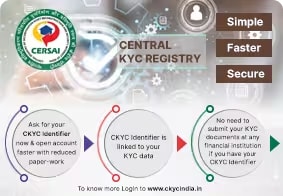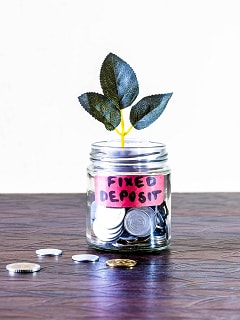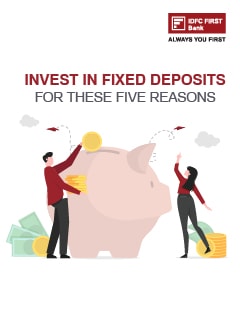Enjoy Zero Charges on All Commonly Used Savings Account Services
- About Us
- MD & CEO letter about the bank
- MD & CEO
- Our History
- Letter to Shareholders on the 1st Annual Report after Merger
- Letter to Shareholders on the 2nd Annual Report after Merger
- Letter to Shareholders on the 3rd Annual Report after Merger
- Letter to Shareholders on the 4th Annual Report after Merger
- Board of Directors
- Awards & Accolades
- News Room
- Investors
- Careers
- ESG
-
Customer care hotlineCall 1800 10 888
-
As per amendment in the Income Tax Rules, PAN or Aadhaar are to be mandatorily quoted for cash deposit or withdrawal aggregating to Rupees twenty lakhs or more in a FY. Please update your PAN or Aadhaar. Kindly reach out to the Bank’s contact center on 1800 10 888 or visit the nearest IDFC FIRST Bank branch for further queries.
-
-
FinFIRST Blogs
There are several reasons to open a fixed deposit. A major one being that they are immune to fluctuating market conditions and interest rates. However, with so many investment options available out there, how do you know when to invest in a fixed deposit?
In this article, we’ll evaluate the pros and cons to help you decide when it makes sense to invest in a fixed deposit.
Fixed Deposit Investment Advantages
The benefits of investing in FDs are numerous; let’s examine some of them.
· Fixed deposit investments earn a higher interest than savings accounts. So if you have a lot of money lying in your savings account, which you don’t plan to use in the next few years, it’s wise to put it in an FD. Senior citizens get a higher rate of interest. IDFC FIRST Bank offers the best rates upto 7.75%* (8.25% for senior citizens). *
*Interest rates are subject to change
READ MORE
· As per Section 80C of the Income Tax Act, 1961, the principal amount in a Tax Saver FD is tax-free. Thus, FDs are a great tax-saving option for salaried individuals as well as business owners. However, the FD must be held for at least five years to qualify for tax exemption. Also, the maximum deposit limit is Rs 1.5 lakh for tax exemption.
· As you might already know, fixed deposit investments are risk-free and insured by the RBI up to Rs. 5,00,000. Additionally, no matter how the market is doing, the bank or financial institution where you made the deposit is legally bound to pay you interest at a fixed rate. Unlike investing in the stock market, your FD investment doesn't lose money during a market downturn.
In addition to being risk-free, fixed deposit investments are insured by the RBI up to a limit of Rs. 5,00,000.
· FD investments help you achieve short- and long-term financial goals. Since your interest earnings are guaranteed regardless of the market conditions, you will know exactly how much you’ll earn by the end of the investment tenure. This allows you to set clear financial goals for the future, such your child's wedding or a down payment on a home loan.
· What also helps in financial planning is its flexibility in tenure; fixed deposit investments can have tenures ranging from one week to 10 years. This means, depending on your capacity and purpose, you can choose your tenure of FD investment. Moreover, longer tenures usually mean higher interest rates (see sub-section under Longer Tenures, Higher Rates).
For example, say you are 25 and plan to buy an apartment with a loan by the time you are 30, but you need a substantial down payment for that. You can invest in a fixed deposit for five years and apply for a loan when you have reached your financial target. For each goal, you can have a separate fixed deposit investment.
· By locking your money in a fixed deposit for a fixed period of time, you avoid touching it for unnecessary purchases. This allows your money to grow and earn more interest than letting it sit in a savings account.
· A fixed deposit can be liquidated before its lock-in period ends. FD investments provide you with easy access to your funds in case of an emergency. A partial withdrawal facility can be extremely helpful during financial emergencies, such as unexpected hospitalisation. However, there is a small penalty charge for withdrawing your money.
· Fixed deposit investments also facilitate overdraft up to 90% of the principal amount. You can also get a premium credit card, such as the IDFC FIRST WOW! Credit Card, issued against your fixed deposit.
· In addition, the interest rates on FD investments and pay-out periods are both flexible. Interest can be paid at different intervals depending on the term you choose – payable either on maturity, annually, quarterly, or monthly. Plus, the interest rate on longer tenures is higher than on shorter tenures.
· It's possible to transfer your FD investments from one branch to another within the same bank.
· And finally, FDs can also be renewed automatically via internet banking; there is no need for a physical trip to the bank.
Fixed Deposit Investment Disadvantages
· A risk-proof investment has its costs, and these include lower interest rates than other investment opportunities. An FD account's 7.75% interest rate may be higher than that of a savings account, but it is still below the average rate return from mutual funds (typically over 15%). Mutual funds are, however, riskier than fixed deposits and can generate negative returns in the face of economic downturn, such as a recession.
· In some cases, the offered interest rate can be lower than the rate of inflation.
· Also, FDs have a uniform interest rate for their complete tenure. This means even if the markets are doing well, your gains are fixed and not show an increase.
Longer Tenures, Higher Rates
As previously stated, opting for longer tenures can yield higher interest rates, as demonstrated by the rate chart of IDFC FIRST Bank below. The bank offers the best fixed deposit rates for both general investors and senior citizens, with the latter earning an additional 0.50% in interest.
The table below shows the interest rate for FDs under Rs. 2 crore at IDFC FIRST Bank; choose your tenure to maximize your returns:
| Tenure | FD rates for Non-Senior Citizens | FD rates for Senior Citizens |
| 7 – 14 days | 3.00% | 3.50% |
| 15 – 29 days | 3.00% | 3.50% |
| 30 – 45 days | 3.00% | 3.50% |
| 46 – 90 days | 4.50% | 5.00% |
| 91 – 180 days | 4.50% | 5.00% |
| 181 days – less than 1 year | 5.75% | 6.25% |
| 1 year | 6.50% | 7.00% |
| 1 year 1 day – 548 days | 7.50% | 8.00% |
| 549 days – 2 years | 7.75% | 8.25% |
| 2 years 1 day – 3 years | 7.25% | 7.75% |
| 3 years 1 day – 5 years | 7.00% | 7.50% |
| 5 years- 1 day – 10 years | 7.00% | 7.50% |
Source: IDFC FIRST Bank
Use the FD calculator to determine the maturity amount for a given principal amount and tenure.
Summary
FDs can be a useful tool for diversifying your investment portfolio, especially during market uncertainties, rising inflation, geopolitical concerns, as well as economic slowdowns. They help minimizing the risk associated with market fluctuations, offering steady returns while safeguarding your capital.
Not only does this strategy keep your funds safe in a risk-free environment, but it also allows you to earn a fixed higher interest rate compared to a savings account, leading to better returns. Additionally, tax-saver fixed deposit investments can help you achieve your short-term and long-term objectives, while also providing tax benefits.
Since interest rates vary across banks, it is crucial to research all available options before making an FD investment. It's worth noting that IDFC FIRST Bank offers the most competitive rates, and investors should take this into account when choosing a bank to invest in.
Disclaimer
The contents of this article/infographic/picture/video are meant solely for information purposes. The contents are generic in nature and for informational purposes only. It is not a substitute for specific advice in your own circumstances. The information is subject to updation, completion, revision, verification and amendment and the same may change materially. The information is not intended for distribution or use by any person in any jurisdiction where such distribution or use would be contrary to law or regulation or would subject IDFC FIRST Bank or its affiliates to any licensing or registration requirements. IDFC FIRST Bank shall not be responsible for any direct/indirect loss or liability incurred by the reader for taking any financial decisions based on the contents and information mentioned. Please consult your financial advisor before making any financial decision.
The features, benefits and offers mentioned in the article are applicable as on the day of publication of this blog and is subject to change without notice. The contents herein are also subject to other product specific terms and conditions and any third party terms and conditions, as applicable. Please refer our website www.idfcfirstbank.com for latest updates.


 What's special about us
What's special about us


















